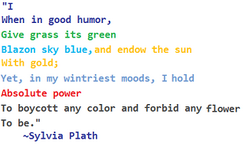|
|
| FAQ/Help |
| Calendar |
| Search |
|
#1
|
|||
|
|||
|
I'm finding it tricky to read myself now that I'm on meds. I've been having bp signs for at least ten years, and I've even aware (but in denial) that I have bipolar for seven years. Seven years no meds I could read myself like a book.
Now I'm confused. I'm awake when this time last night I'd even sleep for 4 hours, I've got two songs playing in my mind along with "playbacks" of people from my day. I can't tell if that's my mind racing as can till concentrate and I not feel anxious. I booked a trip to south America as it was the first thing I'd felt excited about for ages, and I've felt happy at work. I felt positive about he future again. Normal or hypo? For me the last long wh.e normal has been Lying down all day, crying, not leaving my suburb and being to scared to contact people to see them so hanging out alone. Normal? Depressed? Euthymic is not normal for me so I'm not sure where to find it? Or where I'm at now. Thoughts? |
Darth Bane
|
|
#2
|
|||
|
|||
|
oh, this is the biggie, that if we all just knew then life would be so much easier.
it's the "who am I" dilemna. what is normal and what is hypo. what is depressed and what is sad. I think it's important to understand the difference between a normal range of emotions and those of bp. everyone gets overly excited and everyone gets really sad. that is ok. and we are going to experience those things too. I think that learning to differenciate between our extreme mood swings and the normal range of emotions are a good thing and they will help us with understanding ourselves. it's easy to think that a "normal" person never gets too overly excited or really sad but that's just not the case. We are extreme in our moods when the bp takes it's toll on us. We can definitely see and feel it when things get extreme... so I would recommend using that as a gauge. If you are not being extrememly depressed or hypo or manic, which I'm sure you will be able to tell, then you are being yourself. Your normal self. Gotta think, all the crazy **** that the "normals" do..... |
|
#3
|
||||
|
||||
|
If either situation (hypothetical hypomania or depression) is prompted by an external event, then it's probably normal. If you've always wanted to go to South Africa, then it is perfectly reasonable to be very excited about an upcoming trip and to even have racing thoughts, as they are part of excitement. Likewise, crying all the time and isolating yourself makes sense if you've experienced a severe emotional event, like a break up.
If either of these mind states happen for no reason, last for a long time, or last for a short time but alternate with each other very quickly, then they're probably part of your bipolar disorder. The best gauge is whether or not your mood causes you distress. Normal people have "mood swings", but not to the extent where they wish they were dead or do crazy things that have bad consequences. If you're so depressed that you feel like you cannot take anymore, or so manic that you can't think straight or regulate your behavior, you're in dangerous territory.
__________________
I dwell in possibility-Emily Dickinson Check out my blog on equality for those with mental health issues (updated 12/4/15) http://phoenixesrisingtogether.blogspot.com 
|
|
#4
|
||||
|
||||
|
Also, it's completely possible to not experience "normal mood" very often, even with medication. "Textbook" bipolars have clear cut phases of extreme depression and mania, with periods of complete remission in between. In reality, no one looks like that. Some people are rapid cyclers, or often mixed, or have a cyclothymic temperament (a tendency to have daily mood swings on top of their longer bipolar cycles).
I know that I don't ever really feel "normal". The time when I thought I had reached that point, it turns out that I was experiencing low grade mania. Again, it doesn't really matter unless it causes you distress.
__________________
I dwell in possibility-Emily Dickinson Check out my blog on equality for those with mental health issues (updated 12/4/15) http://phoenixesrisingtogether.blogspot.com 
|
|
#5
|
||||
|
||||
|
I know that "normal" people get songs stuck in their head and play-backs of the day and also insomnia, too. The thing with bipolar is that these things can trigger you one way or the other. I think the big key is looking for patterns. If this is happening only on one day, then something triggered it and you're not hypo or depressed. But if it continues, then that's when you need to start watching your red flags.
Do you keep a mood tracker? I think that would be a good thing to do if you haven't been. It can help you pick out a pattern because sometimes we forget exactly how we felt from one day to the next. Also, even good stress is still stress. So a trip is good stress but planning it is still stressful. So, even if you're happy it can still trigger you.
__________________
 |
| Reply |
|
|